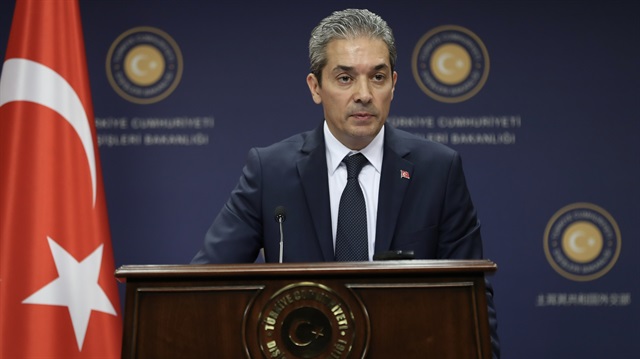
Foreign ministry spokesman Aksoy says Ankara will retaliate if ban is approved
Turkey will retaliate in kind if the United States enacts a law to bar Ankara from purchasing Lockheed Martin's F-35 Joint Strike Fighter jets, foreign ministry spokesman Hami Aksoy said on Friday.
Aksoy told a news conference that Turkey had fulfilled all requirements to procure F-35 jets from the U.S. and that Ankara expected all sides to carry out their responsibilities.
A U.S. Senate committee passed its version of a $716 billion defense policy bill on Thursday, including a measure to prevent Turkey from purchasing the F-35 jets.
Ankara will also take every initiative to protect its firms from U.S. sanctions, Aksoy added, a day after the United States imposed sanctions on several Iranian and Turkish companies in a move targeting Iranian airlines.
Aksoy stated that a U.S. delegation began negotiations with Turkish officials on Manbij, northern Syria on Friday. Turkey and the U.S. have established working groups to discuss the stabilization of Manbij and to prevent any undesirable clashes.
The first meeting of the working group on Syria was held on March 8-9 in Washington.
“The second part of this meeting is being held today. We are hosting the U.S. delegation,” Aksoy said.
Manbij will remain the key focus of Friday's meeting, said Aksoy and added the minutes of Friday's meeting will be released after a meeting between Foreign Minister Mevlüt Çavuşoğlu and his U.S. counterpart Mike Pompeo on June 4 in Washington.
The Manbij district of Syria’s Aleppo province was invaded by the YPG/PKK terror group in August 2016 with U.S. support.
Ankara has said it might extend Operation Olive Branch, which aims to clear the northwestern Afrin region of terror elements, further east to Manbij unless the PYD/PKK terrorist group leaves the strategically-located city.
U.S. military support for the terrorist PYD/PKK terror group in Manbij has strained ties between Ankara and Washington and has led to fears of potential clashes on the ground between troops of the two NATO allies. There are roughly 2,000 U.S. troops in the city.
On Wednesday, the Greek Council of State approved the right of asylum for eight former Turkish soldiers who had fled Turkey after the defeated coup on July 15, 2016.
Emphasizing that the decision is against international law, Aksoy said: "A democratic country should not protect putschists. In the future, we expect the Greek judiciary to not repeat similar mistakes."
The supreme administrative court evaluated Greek government's objection to the right of asylum given by the Greek Asylum Commission to Suleyman Ozkaynakci, one of the former Turkish soldiers.
The decision set a precedent for the other seven ex-soldiers; their right of asylum was also approved.
On May 12, Iraqis voted in the country's first parliamentary elections since 2014.
The use of electronic voting machines -- for the very first time -- however, led to allegations of voter fraud, especially in the cities of Sulaymaniyah and Kirkuk.
"A report by electoral watchdogs also confirms this. The investigation of the allegations by the Iraq's Independent High Electoral Commission will make transparent the legitimacy of the elections," Aksoy said.
On Kuwait's move in United Nations Security Council (UNSC) for Gaza, Aksoy said: "In case it is not approved, we, as the term president of Organization of Islamic Cooperation, will raise the topic at the UN General Assembly with the head of Arab group.
On May 18, Kuwait submitted a draft resolution at the UNSC that condemns Israeli violence and calls for "protection of the Palestinian people" in Gaza.
Tension has mounted in the Palestinian territories since last December, when U.S. President Donald Trump officially recognized Jerusalem as Israel’s capital.
On May 14, at least 65 Palestinian protesters in the eastern Gaza Strip were martyred -- and thousands more injured -- by Israeli army gunfire.




